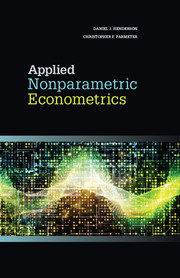Book contents
- Frontmatter
- Dedication
- Contents
- 1 Introduction
- 2 Univariate density estimation
- 3 Multivariate density estimation
- 4 Inference about the density
- 5 Regression
- 6 Testing in regression
- 7 Smoothing discrete variables
- 8 Regression with discrete covariates
- 9 Semiparametric methods
- 10 Instrumental variables
- 11 Panel data
- 12 Constrained estimation and inference
- Bibliography
- Index
1 - Introduction
Published online by Cambridge University Press: 05 February 2015
- Frontmatter
- Dedication
- Contents
- 1 Introduction
- 2 Univariate density estimation
- 3 Multivariate density estimation
- 4 Inference about the density
- 5 Regression
- 6 Testing in regression
- 7 Smoothing discrete variables
- 8 Regression with discrete covariates
- 9 Semiparametric methods
- 10 Instrumental variables
- 11 Panel data
- 12 Constrained estimation and inference
- Bibliography
- Index
Summary
Overview
The goal of this book is to help bridge the gap between applied economists and theoretical nonparametric econometricians/statisticians. The majority of empirical research in economics ignores the potential benefits of nonparametric methods and many theoretical nonparametric advances ignore the problems faced by practitioners. We do not believe that applied economists dismiss these methods because they do not like them. We believe that they do not employ them because they do not understand how to use them or lack formal training on kernel smoothing. Many theoretical articles and texts that develop nonparametric methods claim that they are useful to empirical researchers, which they often are, but many times the level of mathematics is too high for a typical economist or the detail with which the practical considerations are explained is not adequate except for those well versed in econometrics. At the same time, many of these articles and textbooks skip (or do not have room to include) the nuances of the methods which are necessary for doing solid empirical research.
Although nonparametric kernel methods have been around for nearly six decades, their use in economics journals did not become popular until the twenty-first century (noting that there were influential papers prior to 2000). In our opinion, two major developments have drastically increased the use of nonparametric methods in economics. The first is obvious: computing power. Without computers that can quickly provide estimates (coupled with efficient code), these methods are largely impractical for applied work. Of course, we cannot discount the importance of complementary statistical packages for nonparametric methods, such as the popular np package (Hayfield and Racine, 2008) in the R language (2012). The combination of higher-powered computers and available software has done much to popularize the methods across academic fields.
For economics, the second reason we believe this prevalence has increased of late is the assortment of new estimators which allow researchers to handle discrete data. We know that economic data is generally a combination of continuous and discrete variables.
- Type
- Chapter
- Information
- Applied Nonparametric Econometrics , pp. 1 - 14Publisher: Cambridge University PressPrint publication year: 2015



